|
|
|
Sort Order |
|
|
|
Items / Page
|
|
|
|
|
|
|
| Srl | Item |
| 1 |
ID:
084069
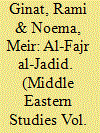

|
|
|
|
|
| Publication |
2008.
|
| Summary/Abstract |
This article claims that all of the objectives put forth by the Egyptian revolutionary regime appeared in the leftist journal al-Fajr al-Jadid several years prior to the July 1952 revolution. The authors' central claim is also that the essentials of Nasserism including its basic tenets neutralism, pan-Arabism, and Arab socialism were clearly articulated in al-Fajr al-Jadid. Although there is no clear-cut evidence to show the existence of neither political nor ideological direct links between Nasser and the al-Fajr al-Jadid's group, this article clearly demonstrates the existence of remarkable ideological textual similarities between Nasserite's and al-Fajr al-Jadid's revolutionary ideas.
|
|
|
|
|
|
|
|
|
|
|
|
|
|
|
|
| 2 |
ID:
084072
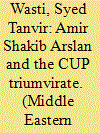

|
|
|
|
|
| Publication |
2008.
|
| Summary/Abstract |
Amir Shakib Arslan was a Druze aristocrat and one of many loyal non-Turkish Ottomans who were in the forefront of the political and cultural scene in the final years of the Ottoman empire. As a poet, author, journalist and Ottoman deputy, he chronicled the political events of the time in which he took part. Amir Shakib Arslan had friendly personal relations with the triumvirate of Talat, Enver and Cemal pashas. As such, he was able to penetrate into the inner circles of the Committee of Union and Progress (CUP) and offer support as well as salutary advice.
|
|
|
|
|
|
|
|
|
|
|
|
|
|
|
|
| 3 |
ID:
084074


|
|
|
|
|
| Publication |
2008.
|
| Summary/Abstract |
Israel has very limited indigenous hydrocarbon resources and is located next to the energy-rich Persian Gulf region. This study is divided into two parts. The first part profiles Israel's energy outlook. Specifically, it examine the country's oil and natural gas exploration and potential. The second part discusses the seemingly successful negotiations to export natural gas from Egypt to Israel. This is followed by an analysis of the efforts to export Iraqi oil via Israel (the Mosul-Haifa pipeline) and the attempt to revive the scheme in the aftermath of the 2003 war in Iraq. Finally, the article examines the short-lived experience in exporting Iranian oil to Israel under the Shah and the current status of the Trans-Israel pipeline. The study suggests that regional energy cooperation would benefit all parties and international energy markets. However, such cooperation is unlikely in the near future.
|
|
|
|
|
|
|
|
|
|
|
|
|
|
|
|
| 4 |
ID:
084078


|
|
|
|
|
| Publication |
2008.
|
| Summary/Abstract |
The Emergency Committee was established on October 1947 to meet the challenges of British evacuation and the urgent needs of war. The Jewish leadership realized that the existing structure of institutional self-rule was not sufficient for coping with the demands of the new era. Fearing a total collapse of administration that could lead to governmental vacuum, it was decided to create one unified planning centre that would supervise planning and policy making of the future governmental system. Two major contributions of the committee's work towards the establishment of a new Israeli governmental system are to be noted. Firstly, on the declaration of independence (15 May 1948) the Jewish leadership had a basic blueprint for a governmental administration, covering a wide range of professional manpower and facility needs, pointing out existing strengths and weaknesses in present administrative capabilities, Secondly, during the process of planning and running essential services, the future government gained unprecedented experience in operating on a national scale during wartime.
|
|
|
|
|
|
|
|
|
|
|
|
|
|
|
|
| 5 |
ID:
084077
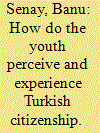

|
|
|
|
|
| Publication |
2008.
|
| Summary/Abstract |
Citizenship is generally perceived as a political practice that falls within the historical domain of the nation-state. At least, this is the claim of many nation-states themselves, which disavow the possibility of citizenship outside of their own structures. Rather than concentrate on the organization of citizenship, this article, instead, concentrates on the experience of individual citizens. It explores a wide-ranging sample of Turkish youth's perceptions and practices of citizenship, focusing on three dimensions: citizenship as legal status; citizenship as identity; and citizenship as civic virtue. It argues that individuals' perceptions and experiences of citizenship can be mapped out according to these three dimensions, and, additionally, political affiliation or commitment is the key to young people's preference for any one of these dimensions. Thus the legal status aspect of citizenship was emphasized by liberal and republican young people; nationalist, Islamist and Kurdish youth were concerned for its identity aspects; and the civic virtue aspect was stressed by republican and leftist respondents. However the article also demonstrates that similarly to the experiences of young people themselves, these three aspects of citizenship are not clearly demarcated theoretical domains but are both deeply interrelated and conflicted with each other. The reasons for this lie in the practice and understanding of citizenship facilitated and propagated by the Turkish state.
|
|
|
|
|
|
|
|
|
|
|
|
|
|
|
|
| 6 |
ID:
084076


|
|
|
|
|
| Publication |
2008.
|
| Summary/Abstract |
Turkey's heavy involvement in Middle Eastern politics following the end of the Cold War eroded its Western image in the eyes of most Europeans and strengthened the hands of those who have traditionally argued against Turkey's EU membership by referring to the unbridgeable inherent differences between the parties in terms of cultural, historical, religious, and geographical considerations.
|
|
|
|
|
|
|
|
|
|
|
|
|
|
|
|
| 7 |
ID:
084067


|
|
|
|
|
| Publication |
2008.
|
| Summary/Abstract |
Drawing on critical whiteness studies, this article explores the role of race in the formation and maintenance of Turkish identity. The aim is to make connections across time (between contemporary Turkey and its past), space (placing the Turkish experience within a transnational context), and theoretical perspectives (investigating questions arising from the framework of whiteness within the context of Turkey). I argue that the literature of nationalism alone cannot illuminate the significance of racial vocabularies in early republican (1923-50) and contemporary Turkey. In criticizing current approaches that ignore the reality of race in Turkey, this article proposes a theoretical perspective in which race and whiteness emerge as a decisive component of Turkish modernity. Taking race seriously not only helps us to understand the Turkish experience of modernization but also extends theories of race. The article presents the manifestations of racial vocabularies in terms of immutability and chromatism as embedded in Turkish identity.
|
|
|
|
|
|
|
|
|
|
|
|
|
|
|
|
| 8 |
ID:
084071
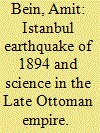

|
|
|
|
|
| Publication |
2008.
|
| Summary/Abstract |
A devastating earthquake hit Istanbul and its environs shortly after noon on 10 July 1894. Although seismic disturbances were quite frequent in the long history of the Ottoman capital, the imperial city had not witnessed such violent tremors in more than a century. Hundreds of people died and thousands more were injured as a result of the complete or partial collapse of private dwellings, mosques, churches, synagogues and other public buildings. The earthquake of July 1894 hit the seat of the Ottoman government during a period of rapid socio-cultural change and shortly before the empire faced one of its worst crises in the late nineteenth century. As may be expected, many people in the Ottoman lands sought an explanation to the calamity that befell the inhabitants of the capital and neighbouring regions. Some could draw on long-standing interpretive traditions that were primarily either theological in nature or based on classical naturalist theories. However, the Ottoman intelligentsia rejected such explanations out of hand. The Ottoman response to the earthquake mirrored the similar embrace of science's authority and adoption of scientific methods and tools in many other contemporary societies. The process of the expansion and globalization of scientific knowledge expanded beyond the boundaries of Europe and its colonies. Science and technology were widely perceived to be the measure of civilization and modernity. The Ottoman intelligentsia and political elite were therefore invested in helping the Ottoman Empire meet standards that were set in Europe and North America but also achieved quite successfully in Japan. They seized upon the earthquake of 1894 to disseminate knowledge of modern earth sciences and implement new methods of scientific study of seismic events in the Ottoman lands.
|
|
|
|
|
|
|
|
|
|
|
|
|
|
|
|
| 9 |
ID:
084070
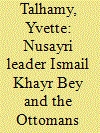

|
|
|
|
|
| Publication |
2008.
|
| Summary/Abstract |
Isma'il Khayr Bey was an outstanding chief of the Matawira Nusayri/'Alawi tribe which during a short time succeeded in controlling a large heterogeneously populated region and gained himself a prestigious title as 'governor of the mountain'. Though the Nusayris admired Isma'il for his courage they suffered from his oppressive rule. The local Muslim inhabitants of the mountain detested the fact that their governor was a Nusayri. The Ottomans were alarmed by Isma'il's growing status in the region and decided to put an end to his rule. The fact that Nusayri society lacked internal solidarity helped the Ottomans achieve their goal. Ultimately, Isma'il was killed by his own uncle.
|
|
|
|
|
|
|
|
|
|
|
|
|
|
|
|
| 10 |
ID:
084068


|
|
|
|
|
| Publication |
2008.
|
| Summary/Abstract |
The recent 'cartoon crisis' caused by European newspapers that published disrespectful caricatures of the prophet Muhammad and offended Muslims all over the world, intensified the discussions on 'the clash of civilizations'. The present religious quarrels, as distressing as they are, remind us of the uproar Suleyman Nazif (1870-1927), a Muslim Turkish nationalist caused in Turkey in 1924. At that time the bone of contention was not a cartoon but the 'Open Letter to Jesus' Nazif published followed by his 'The Reply of Jesus' and in both of which he condemned the 'crusader mentality' of the Christian world. Being political satires, these letters reflect the views of Suleyman Nazif on the imperialist European powers, show his attempt to defend the newly founded Turkish Republic and illustrate how relations between Turkey and Europe had been deepening the prejudices of Muslims and Christians toward each other. This contribution presents translations of Nazif's two letters, preceded by an overview of Muslim-Christian polemics in the late Ottoman Empire and the early Turkish Republic.
|
|
|
|
|
|
|
|
|
|
|
|
|
|
|
|
|
|
|
|
|